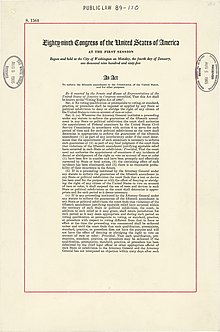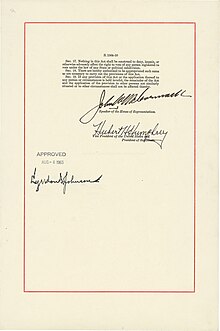Voting Rights Act

The Voting Rights Act of 1965 ( German Voting Rights Act of 1965 ) is an American federal law , the equal participation of minorities, especially African Americans is to ensure in US elections.
Specifically, it abolished discriminatory illiteracy tests for potential voters, banned gerrymandering when it disadvantaged minorities, centralized federal voter registration in areas where fewer than 50 percent of the population were registered voters, and gave the US Department of Justice various control over it Electoral law in areas where African Americans make up more than five percent of the population.
The bill passed both Houses of Congress by a large majority, was signed by then President Lyndon B. Johnson on August 6, 1965, and was renewed by Congress in 1970, 1975, 1982 and 2006 respectively.
In June 2013, the United States Supreme Court overturned Section 4b of the Act, which defines the states and counties whose voting rights require prior approval under Section 4a of the Act. That decision led to controversial discussions in politics and the US public.
background
The law responded to the fact that illiteracy tests and other local measures, particularly in the southern states, were used to systematically exclude, on average, poorer and less educated African Americans from voting. Since the electoral laws in the United States are generally not regulated at the federal level and the segregation-promoting Southern Democrats in the southern states had stable majorities in the state organs, they had many opportunities to circumvent or soften the provisions of the constitution that discriminate against Forbidden to African Americans. Ensuring equality of suffrage was one of the main demands of the American civil rights movement .
In general, there is no “right to vote” in the United States; the right to vote is a legal privilege granted by the state. Along with three additional articles to the Constitution of the Voting Rights Act has led to the Supreme Court a fundamental right ( fundamental right has found) to have the right to vote. Restrictions on the right to vote are not excluded, but require a detailed constitutional investigation.
legislation
The debates over the Voting Rights Act coincide with the height of the civil rights movement and the Selma-to-Montgomery marches . Martin Luther King , the leading African-American civil rights activist at the time, already called for such a law at a meeting with US President Lyndon B. Johnson in December 1964. The president was positive about the project, but King said that such a law was hardly politically feasible so shortly after the civil rights act to desegregate. Johnson, who had recently been overwhelmingly re-elected , initially wanted to focus on other areas such as poverty alleviation and health care in his Great Society reform project aimed at social equality . After the incident in Selma, however, he changed his stance and assured King that he would want to enforce the electoral law as soon as possible.
Johnson passed the bill to Congress on March 17, 1965 after speaking to Senators and MPs in plenary two days earlier. This address was remembered primarily for his use of the saying in the civil rights movement's anthem We Shall Overcome . After an unsuccessful filibuster attempt in the Senate , the Senate passed it on May 25th of that year, the House of Representatives on July 10th. Since US laws have to be passed verbatim by both chambers of Congress and various amendments have been passed in both chambers, the law went to the mediation committee, which worked out a consensus version. The House of Representatives passed the bill on August 3, 1965 and the Senate on August 4. President Lyndon B. Johnson signed it on August 6 at a ceremony in the Capitol , attended by numerous African-American civil rights activists such as Martin Luther King.
Voting
Original draft:
Senate: 77–19
- Democrats: 47-17
- Republicans: 30-2
House: 333-85
- Democrats: 221-61
- Republicans: 112-24
Consensus version:
Senate: 79–18
- Democrats: 49-17
- Republicans: 30–1
House: 328-74
- Democrats: 217-54
- Republicans: 111-20
renovation

Congress passed the Voting Rights Act for a limited period only, so it had to renew it in 1970, 1975, and 1982. In 1982 and 2006 he extended it for a further 25 years. All of the renewals were signed by Republican presidents ( Richard Nixon 1970, Gerald Ford 1975, Ronald Reagan 1982, and George W. Bush 2006). However, one paragraph of this was declared to be repealed by the Supreme Court in 2013 (see below).
release
Section 5 of the law requires the United States Department of Justice to preclear any attempt to change voting rights in covered jurisdictions . The organization that wants to change the electoral law has to prove that this change does not aim to exclude minorities from voting.
Areas that needed clearance
- Alabama
- Alaska
- Arizona
- Georgia
- Louisiana
- Mississippi
- South carolina
- Texas
- Virginia , except Fairfax , Frederick County, and Shenandoah Counties
- Individual counties in California, Florida, New York, North Carolina and South Dakota and some cities in Michigan and New Hampshire.
Repeal of Section 4 by the Supreme Court
The regulation, which states, counties and municipalities require a release was on June 24, 2013 by the Supreme Court of the United States in the case v Shelby County. Holder invalidated. In the judgment given with five against four judges' votes, the court stated that the determination of which administrative units require approval from the federal government was no longer up to date. The conditions in those regions have changed significantly since the 1960s, which means that the regulation is no longer justified. Indeed, this allocation has not been renewed since the 1975 extension. The verdict was heavily criticized by civil rights activists, and US President Barack Obama was disappointed about the verdict. Other voices, however, see the rights of the individual states strengthened by the judgment. However, the court also made it clear that state oversight of the right to vote, as set out by the Voting Rights Act, in itself still applies. The decision “in no way affects the permanent nationwide ban on racial discrimination in elections,” the Supreme Court said. In a special vote , the outvoted judge Ruth Bader Ginsburg described the judgment as hubris , as it massively violated the separation of powers . It is the job of Congress to make the laws, and it has regularly confirmed the Voting Rights Act, most recently in 2006. The court is not entitled to repeal part of the law because it replaces Congress and wants to decide how the law should have been adjusted.
As a result of the ruling, a bipartisan group of MPs introduced a draft to Congress in early 2014 to reintroduce a preliminary review for electoral laws from states and regions that have had an electoral law repealed by a court in the past 15 years. Other violations of the Voting Rights Act should also result in a state being subjected to prior checking. The bill did not come to the vote in Congress.
Web links
- Transcript of the Voting Rights Act (1965) ( Voting Rights Act of 1965 in the wording in ourdocuments.gov)
- United States Department of Justice - Civil Rights Division : Introduction To Federal Voting Rights Laws: The Voting Rights Act of 1965
Individual evidence
- ^ Robert Dallek: Lyndon B. Johnson: Portrait of a President . Oxford University Press, ISBN 0-19-515921-7 , pp. 234ff.
- ↑ msnbc.com: Bush signs Voting Rights Act extension , July 27, 2006 (accessed January 27, 2010)
- ↑ SCOTUS: SHELBY COUNTY, ALABAMA, PETITIONER v. ERIC H. HOLDER, JR., ATTORNEY GENERAL, ET AL. No. 12–96 (PDF; 317 kB)
- ^ Süddeutsche.de: Supreme Court overturns the racism protection clause from June 24, 2013
- ↑ Spiegel.de: Spectacular US judgment: Supreme Court undermines the right to vote for blacks from June 24, 2013
- ↑ SCOTUS: SHELBY COUNTY, ALABAMA, PETITIONER v. ERIC H. HOLDER, JR., ATTORNEY GENERAL, ET AL. No. 12–96 (PDF; 317 kB), JUSTICE GINSBURG, with whom JUSTICE BREYER, JUSTICE SOTOMAYOR, and JUSTICE KAGAN join, dissenting. p 32 ff
- ^ Members of Congress Introduce a New Fix for the Voting Rights Act , The Nation . January 16, 2014. Accessed July 2, 2015.
- ^ Tyler Lewis: Bill Summary: Voting Rights Amendment Act of 2014 . In: VRA for Today . April 28, 2014. Archived from the original on July 7, 2015. Info: The archive link has been inserted automatically and has not yet been checked. Please check the original and archive link according to the instructions and then remove this notice. Retrieved on July 4, 2015: "See also vrafortoday.org "
- ↑ HR 3899 (113th): Voting Rights Amendment Act of 2014 . GovTrack. Retrieved on August 6, 2020: "This bill was introduced on January 16, 2014, in a previous session of Congress, but it did not receive a vote."


